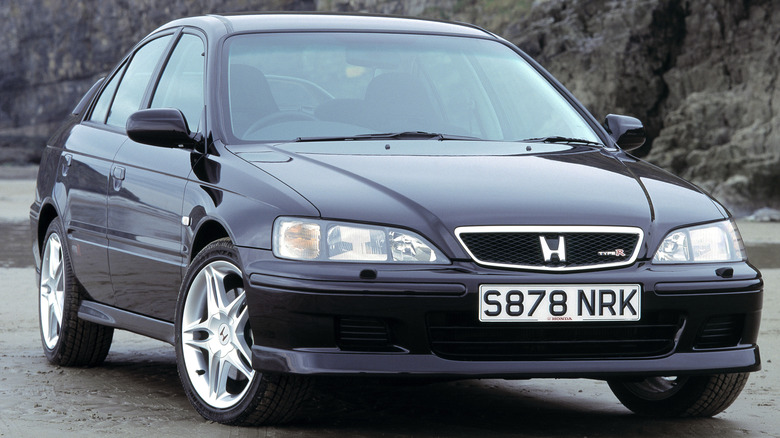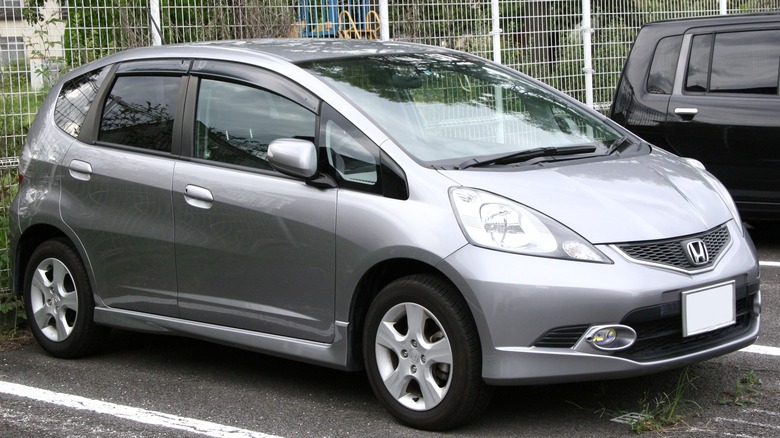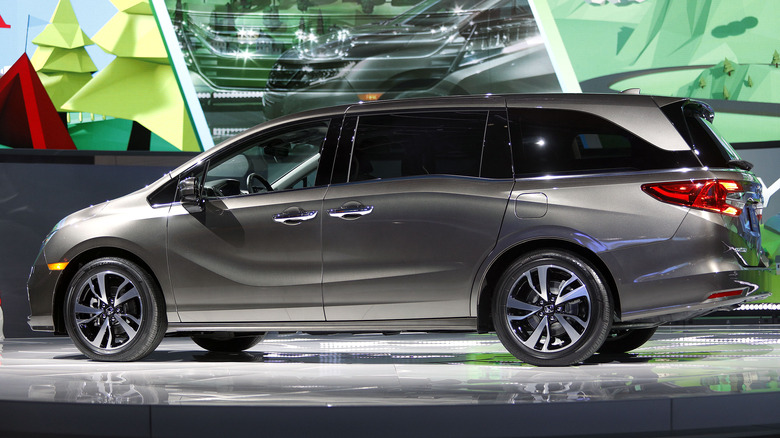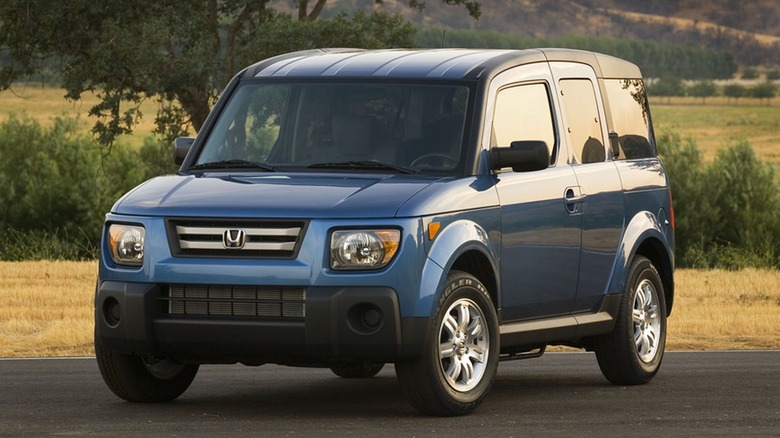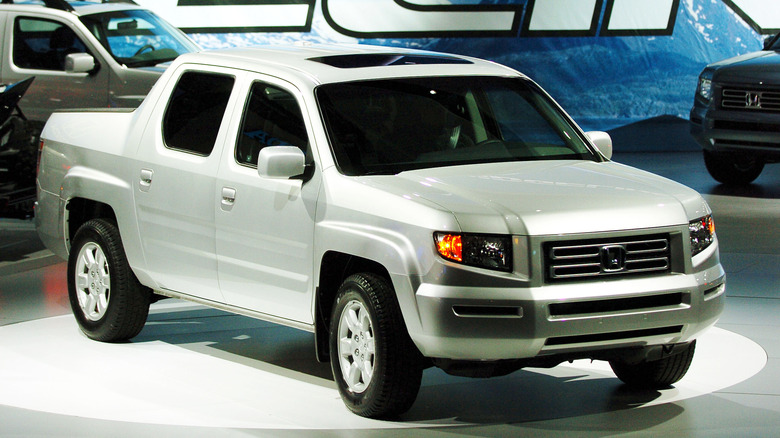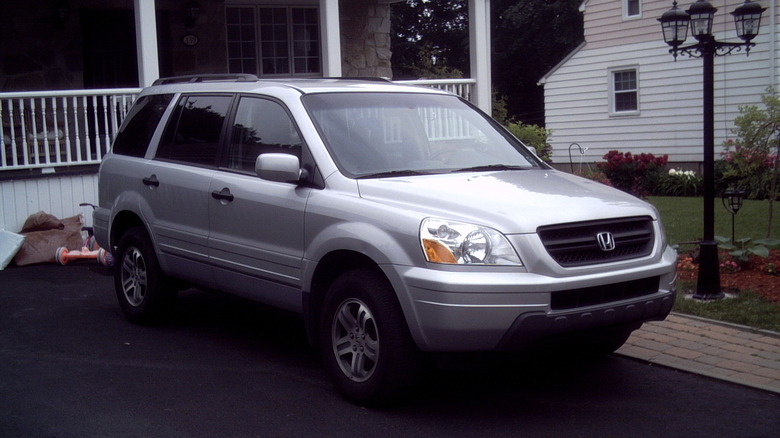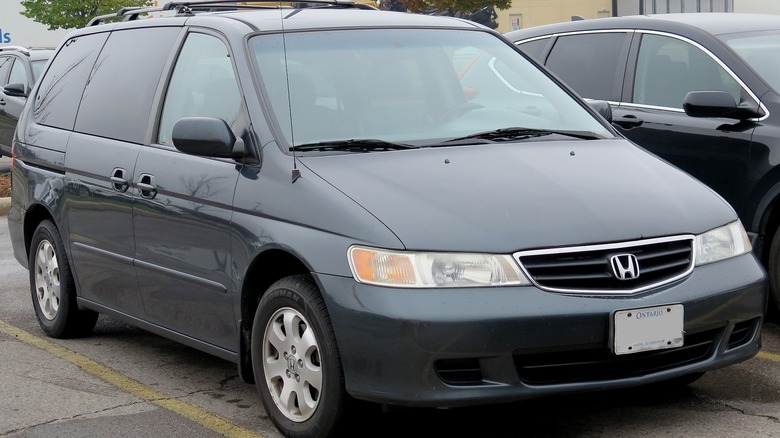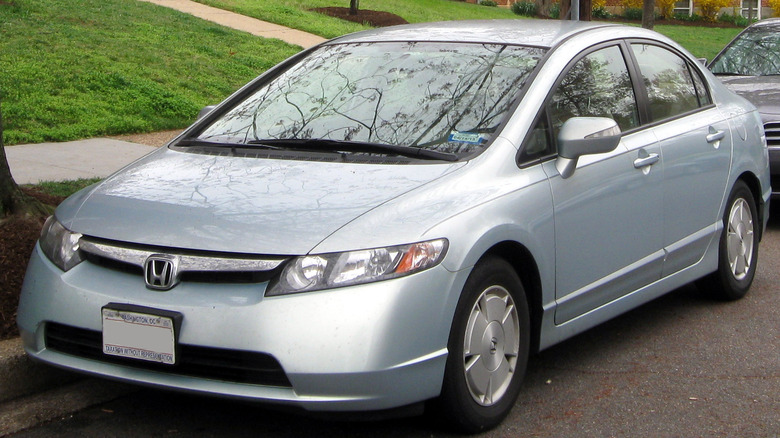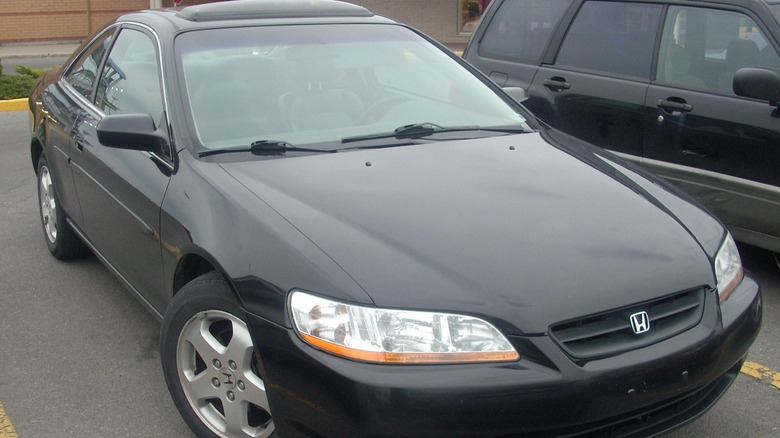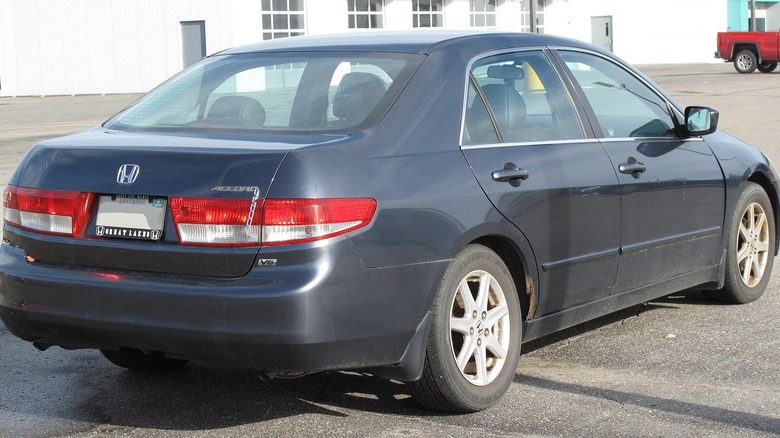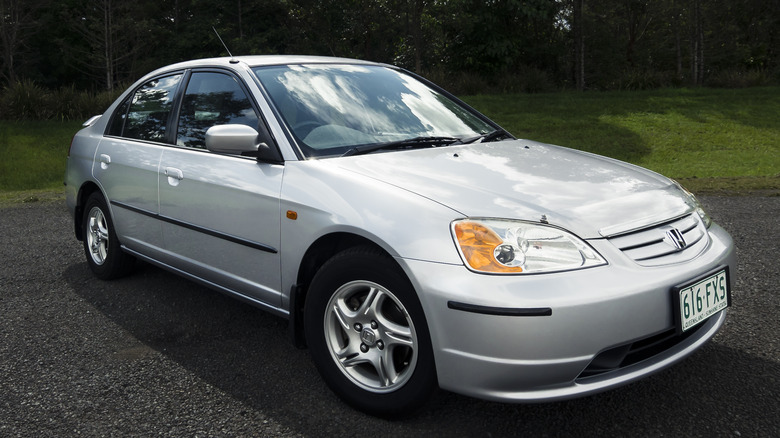10 Hondas With The Most Recalls
When it comes to cars, we always hear about the flashy new features, sleek designs, and crazy stats brands want us to focus on. However, another markedly less flashy side can be just as interesting — the recalls. They're the auto industry's classic "oops" moments, and cover problems that range from minor annoyances to major safety issues.
Honda, like all major car manufacturers, has had its share of recalls. According to Autoweek, a recent recall involved 248,999 vehicles for potential engine damage due to premature connecting rod bearing wear on certain Honda products. However, there is a bright side. Recalls show a company's commitment to keeping us safe and willingness to fix its mistakes. Honda provides information about safety recalls announced in the past 15 calendar years on their official website. All safety recall repairs are free at authorized Honda dealers, which is a reassuring policy if you are a current or prospective owner.
Still, it's important to know about any safety issues before you invest in a new car. So, if you're in the market for a used Honda, check this list first before signing on the dotted line.
10. 2010 Honda Fit
According to the National Highway Traffic Safety Administration (NHTSA), the 2010 Honda Fit was subject to 12 recalls to fix major issues, including problems with the airbags and engine. Many 2010 Honda Fits had potentially explosive airbag issues due to incorrectly assembled or faulty inflators sourced from Takata. Over time, hot and humid conditions could cause these inflators to explode during a crash, sending shrapnel flying at passengers. Obviously, that's super dangerous and could really hurt someone. Thankfully, Honda recalled about 2.2 million cars to replace those bad inflators.
Another big recall was for the driveshaft going between the engine and wheels. Due to a manufacturing snafu, the coating protecting the driveshaft wasn't always applied right on some 2010 Fits. That left it vulnerable to rust and junk on the road. If it rusted through, the driveshaft could snap without warning while the car is in motion. That would cut the power and could even cause the car to roll away if the parking brake wasn't on.
Owners also complained to Consumer Reports about problems with the air conditioning and transmission that took the car out of commission. Some people had electrical issues, too, like the alternator failing and causing battery drainage, starter motor failures preventing the engine from turning over, or ignition switch problems that made it impossible to start the car.
[Featured image by TTTNIS via Wikimedia Commons | Cropped and scaled | CC BY-SA 1.0]
9. 2018 Honda Odyssey
When the 2018 Odyssey first came out we were impressed by all the cool tech packed into it. However, according to federal safety regulators at the NHTSA, this minivan has also seen its fair share of problems, resulting in 13 recalls to resolve various issues. The problems ranged from super scary stuff like the fuel pump conking out resulting in the engine stalling mid-drive to the sliding doors not latching properly and potentially swinging open on the road. There were also braking performance issues and front seatbelts that wouldn't latch correctly.
Owners also reported all sorts of complaints, and the NHTSA logged over 400 gripes about the 2018 Odyssey. Most commonly, people have had electrical glitches and malfunctioning forward collision avoidance systems, often caused by faulty connectors preventing the rearview camera image from displaying. That's not what you want to deal with in something that's supposed to carry your whole family safely. Other issues reported included bugs in the infotainment system, transmission hesitations, or the engine struggling under power.
While Edmunds praised its tech upgrades like Honda Sensing, powerful 3.5L V6 engine, smooth ride, and spacious cabin, owner reviews reflected mixed feelings. Some folks loved the mini-living room vibe, but others certainly could've done without all the niggly technical problems.
8. 2008 Honda Element
The 2008 Honda Element has had 13 recalls logged with the NHTSA, which addressed some serious safety concerns, especially regarding the airbags sourced from Takata and improperly installed airbags. The inflators in some airbags were found to be at risk of exploding over time due to degradation from exposure to heat and humidity. The Element was also part of a massive 2.5 million vehicle recall for Honda cars dealing with a transmission issue. Specifically, there was a fault in the secondary shaft bearing for the automatic transmission that might cause stalling or prevent the car from being parked properly.
Owner reports on sites like CarComplaints also reveal alarming brake issues with the 2008 Honda Element. Many reported abnormally fast wear and tear of brake pads and rotors requiring repair or replacement by around 47,000 miles, with a roughly $300 price tag. Other brake issues included low brake pedal response and warning lights coming on for the Vehicle Stability Assist and Anti-lock Braking systems. Complaints about the vehicle's exterior centered on peeling or flaking paint on the metal body panels. Inside, owners griped about faulty door locks that wouldn't always latch or unlock properly.
Consumer Reports highlighted the Element's stiff ride, pronounced interior noise, and compromised outward visibility due to large roof pillars. Meanwhile, owners complained of frequent exhaust system problems involving the exhaust pipes and manifold, engine cooling issues leading to overheating, and complete failure of the air conditioning system compressors and condensers, costing about $700 on average to fix.
7. 2006 Honda Ridgeline
Although the Honda Ridgeline is one of the most reliable pickup trucks of all time, the NHTSA reports that its 2006 model has been recalled about 14 times. For this reason, the 2006 Honda Ridgeline is one of the used trucks you should steer clear of.
One of its biggest problems was with the airbags. Not only did it deal with the infamous exploding Takata airbag fiasco like many other vehicles, but it also racked up a stunning eight recalls related to the issue. On top of that, some 2006 Ridgelines developed major rust problems around the fuel tank. Honda discovered that exposure to road salt could severely corrode the frame in this area, which is no good since it could cause the fuel tank to detach and increase the risk of fires if gas starts leaking. It's not a risk you want to take, especially if you live somewhere with salty winter roads.
This truck was also recalled for many other issues. The accelerator could sometimes get stuck depressed, preventing the engine from returning to idle promptly after releasing the pedal and increasing the risk of a crash. There were also instances of wiring overheating, posing a fire hazard. Lastly, a recall addressed a potential pinch hazard with the bike arm bracket.
6. 2003 Honda Pilot
The 2003 Honda Pilot is a midsize SUV that hit the market with high expectations and the potential to compete with the Toyota Highlander and Ford Explorer. It promised a perfect blend of utility, comfort, and Honda's trademark reliability. However, as many owners would soon discover, this particular model year was plagued by a series of issues that led to 14 recalls, the NHTSA reports. Like many vehicles from that period, most of the recalls (about nine instances) for the 2003 Pilots were related to Takata's faulty airbag inflators that could explode violently over time.
The other significant reasons for recalling the 2003 Honda Pilot were transmission failures and faulty ignition switches. Under certain conditions, the gear teeth connecting two crucial transmission shafts would overheat, sometimes chipping or snapping clean in half. If this occurred it could cause a full transmission lockup while driving, creating a major safety hazard. Additionally, taking your key out of the ignition without first shifting the gear selector to Park on vehicles with automatic transmissions could cause the Pilot to keep rolling even after you exited. Both issues tended to surface once the odometer hit around 100,000 miles.
Browsing the complaint boards on CarComplaints revealed several issues reported by 2003 Honda Pilot owners. Interiors seemed weak, with common gripes involving chipped chrome on door handles, doors failing to lock properly, busted door lock actuators, uncooperative seat adjusters, and rattling dashboards. Under the hood, numerous owners cited rough idling engines, full-on engine failures, and thumping noises once warmed up. Windows and windshields were also a source of stress, while the suspension system also drew complaints about excessive rust, bumps, and clanks caused by road imperfections.
[Featured image by Bull-Doser via Wikimedia Commons | Cropped and scaled | Public Domain]
5. 2003 Honda Odyssey
The 2003 Honda Odyssey was hit with 15 separate recalls from the NHTSA for various problems. As you can probably guess, faulty airbag inflators were among them. In yet another airbag-related snafu, a component in the airbag control module could fail due to electrical interference, resulting in front, side, and seatbelt pretensioner airbags deploying unexpectedly while passengers were onboard.
Transmission troubles were another big headache. Under certain conditions, like aggressive driving while towing heavy loads, the automatic transmission could overheat and seize up completely. It's not a good situation to find yourself in while zooming down the highway. Manufacturing defects sometimes contribute to this overheating issue as well.
A fuel tank leakage recall was also necessary to address surface imperfections that allowed gas to seep out in some models. If spilled fuel comes into contact with sparks or hot surfaces, it could ignite. Beyond the major issues, there was a nagging problem with the parking brake that could fail and allow the 2003 Honda Odyssey to roll. This concern was part of a larger recall, requiring Honda to recall 800,000 more vehicles.
[Featured image by Elise240SX via Wikimedia Commons | Cropped and scaled | CC BY-SA 4.0]
4. 2006 Honda Civic Hybrid
When the 2006 Honda Civic Hybrid first hit the roads, it seemed like it could really shake things up. Honda pushed hard into hybrid and electric cars, trying to get ahead of the curve as people started caring more about the environment. However, based on its 17 recall history listed with the NHTSA, this first-gen Civic hybrid left a lot to be desired.
One of the biggest recalls was due to issues with the passenger airbag. The hybrid's DC-DC converter also caused tons of problems. This important part of the electric system was prone to failure, which could lead to all sorts of issues like headlights going out, causing a stall, or keeping the engine from restarting, which is definitely not good when you're driving. There was even a recall for potential electrical shorts in the hybrid system itself. Blown fuses from this could also cause stalling, making accidents more likely.
Owners also reported a long list of recurring issues. Electrical issues were at the forefront, with complaints about malfunctioning components and erratic behavior. Engine problems also surfaced, with some drivers experiencing loss of power and poor performance. Issues with the transmission were also noted, leading to concerns about reliability and safety. With so many documented mechanical and electrical bugs, the 2006 Civic Hybrid earned a reputation as one of the used Honda models to avoid.
[Featured image by IFCAR via Wikimedia Commons | Cropped and scaled | CC BY-SA 2.0]
3. 2000 Honda Accord
With a whopping 21 separate recalls listed by the NHTSA, you have to wonder what was going on with this model. One of the biggest concerns was with the exterior lighting — things like reduced visibility and missing amber side reflectors, which were obvious safety risks. These lighting defects could have made it tougher for other drivers to see the Accord at night, raising the chances of accidents.
However, the problems went way beyond just the lights. According to CarComplaints, owners reported all sorts of issues, with transmission failures chief among them. These transmission problems included a significant defect that could lead to performance issues and potential safety hazards. Owners experienced symptoms like difficulty shifting gears, increased RPMs before shifting, and even complete transmission failure at high mileage, with an average repair cost of $2,300 and occurring at an average mileage of 112,000 miles.
In addition to the transmission, there were significant issues with the seat belts and airbags, engine problems, electrical problems, fuel system, interior accessories, the AC/heater system, and body and paint problems, including complaints about the clear coat peeling off, affecting the car's aesthetics and resale value. Given the many issues, it's understandable why the 1998 to 2002 generation of Accords ranks among Honda's least reliable models.
[Featured image by Bull-Doser via Wikimedia Commons | Cropped and scaled | CC BY-SA 2.0]
2. 2003 Honda Accord
NHTSA records show that the 2003 Honda Accord faced 24 safety recalls, primarily involving the Takata airbag inflators at the heart of the largest automotive recall in history. Remarkably, the 2003 Accord was not originally equipped with these defective airbags, but Honda grew concerned that some vehicles may have received replacement Takata airbags over the years, prompting a recall to address this potential safety hazard.
However, the 2003 Accord was subject to a recall due to concerns regarding the power steering hose. Prolonged exposure to high temperatures and power steering fluid could cause premature hose deterioration, leading to cracks and fluid leakage, and the accelerator pedal assembly raised safety issues as well. The rotating portion could potentially bind, preventing the engine from idling after the release of the pedal.
Honda also recalled 351,000 2003 Accord vehicles due to a potential problem with the windshield wiper motor. Water entry into the motor's breather port, designed for venting warm air during normal operation, could lead to internal corrosion and failure of the electrical circuit breaker within the motor housing. Another recall addressed a potential issue with the ignition switch's interlock lever, which could unexpectedly deform, defeating the interlock function on vehicles with automatic transmissions. This raised the risk of the vehicle rolling away unexpectedly if the parking brake was not engaged.
[Featured image by Elise240SX via Wikimedia Commons | Cropped and scaled | CC BY-SA 4.0]
1. 2001 Honda Civic
According to the NHTSA, the 2001 Honda Civic faced unprecedented recalls, receiving the dubious honor of receiving the most recalls in Honda's history at 27. One of the top concerns involved the car's fuel system. The fuel pump — which is vital for getting gas to the engine — could fail prematurely if water got inside. This led to corrosion and potential stalling while driving. Drivers also had to worry about fuel leaks from a defective filler clamp, raising the chance of fires.
In addition, the rear seatbelts didn't always behave as expected. They were meant to keep people secure in crashes but sometimes became stuck after an impact. Stranded passengers could be trapped in emergencies like fires or floods. Transmission woes also plagued this car, with complaints of slipping gears, blown torque converters, and full transmission failure after the check engine light came on. While Honda didn't officially recall the transmissions, it was a chronic concern based on customer reports.
Beyond shifting struggles, the seventh-gen Civics — including the 2001 — also grappled with their share of engine and powertrain issues. Cracked manifolds emitted scary fumes, while stuttering throttles and stalls added to the anxiety of unexpected breakdowns. Finally, of course, no car escaped the mammoth Takata airbag scandal, adding to the long list of issues for this troubled 2001 model year.
